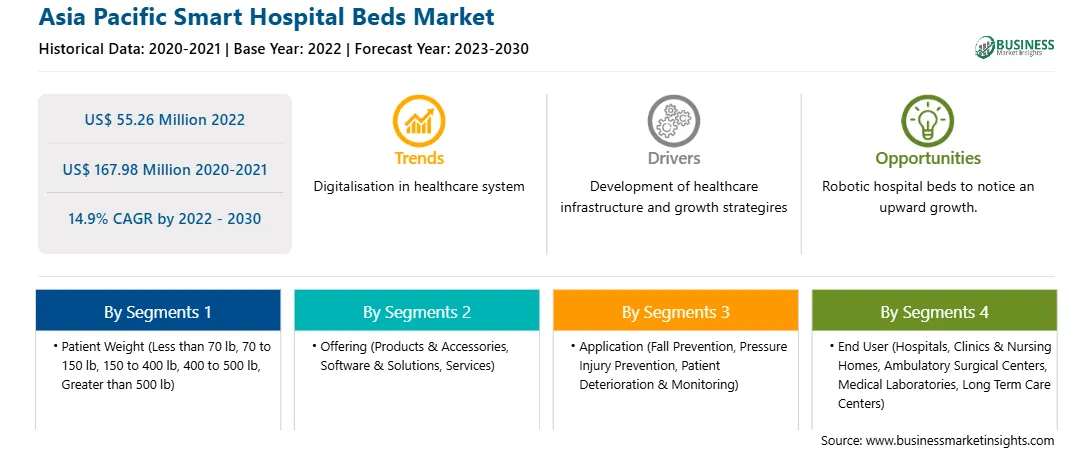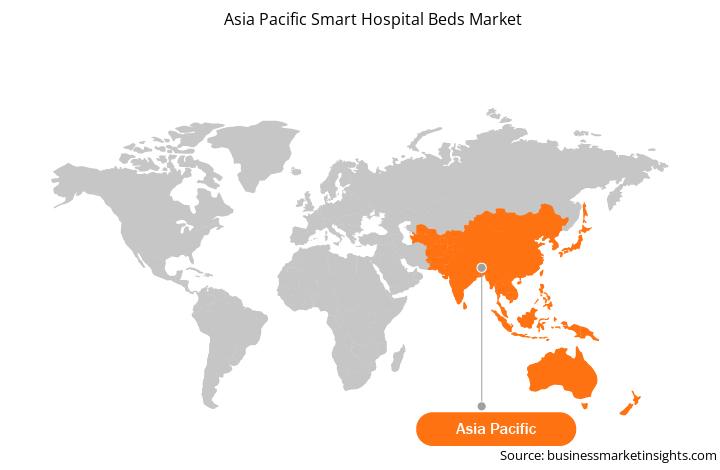Telehealth integration within a smart hospital bed market signifies a transformative opportunity by seamlessly merging remote healthcare services with advanced bed technologies. Enabled by connectivity features, smart beds become integral components of virtual healthcare platforms. This integration facilitates real-time patient monitoring, allowing healthcare providers to remotely assess vital signs, adjust bed settings, and conduct virtual consultations. It enhances accessibility to healthcare services, particularly for patients with mobility constraints or those in remote locations. The synergy between telehealth and smart beds not only supports timely interventions but also fosters a patient-centric approach to healthcare delivery. This collaborative ecosystem empowers patients by enabling them to receive personalized care within the comfort of their homes while promoting efficiency for healthcare providers. The growing emphasis on telehealth services positions the integration of smart beds as a strategic avenue for improving healthcare accessibility, especially in an era emphasizing remote and digital healthcare solutions.
The Asia Pacific smart hospital beds market is segmented into China, Japan, India, South Korea, Australia, and the Rest of Asia Pacific. The growth in the region is driven by increase in respiratory disorders, rise in the number of surgeries performed, expansion of the healthcare sector, and increasing awareness about smart hospital beds. China is known for technological advancements and evolving healthcare needs. Its continuous investments in healthcare infrastructure and adoption of digital technologies in healthcare have created a conducive environment for the growth of the smart hospital bed market. Furthermore, the integration of Internet of Things (IoT) capabilities and artificial intelligence (AI) smart hospital beds aligns with China’s emphasis on smart healthcare solutions, allowing real-time data collection and analysis to enhance patient outcomes. In April 2021, the Faculty of Engineering, Chulalongkorn University; True Group; King Chulalongkorn Memorial Hospital; and Thai Red Cross Society collaboratively developed the 5G Smart beds. The 5G sensors in these smart beds keep track of patients' movements when they try to sit up or get out of bed. Alerts triggered upon movement would allow nurses to rush to their assistance as soon as possible. These beds improve the quality of patients’ lives and reduce the risk of accidents for the elderly people. Thus, with the continuous rise in the demand for more efficient and patient-centered healthcare solutions, the smart hospital bed market is expected to flourish in China in the future.
The Asia Pacific smart hospital beds market is segmented into patient weight, offering, application, end user, and country.
Based on patient weight, the Asia Pacific smart hospital beds market is segmented into less than 70 lb, 70 to 150 lb, 150 to 400 lb, 400 to 500 lb, and greater than 500 lb. The 400 to 500 lb segment held the largest share of the Asia Pacific smart hospital beds market in 2022.
Based on offering, the Asia Pacific smart hospital beds market is segmented into products & accessories, software & solutions, and services. The products & accessories segment held the largest share of the Asia Pacific smart hospital beds market in 2022.
Based on application, the Asia Pacific smart hospital beds market is segmented into fall prevention, pressure injury prevention, patient deterioration & monitoring, and others. The fall prevention segment held the largest share of the Asia Pacific smart hospital beds market in 2022.
Based on end user, the Asia Pacific smart hospital beds market is segmented into hospitals, clinics & nursing homes, ambulatory surgical centers, medical laboratories, long term care centers, and others. The hospitals segment held the largest share of the Asia Pacific smart hospital beds market in 2022.
Based on country, the Asia Pacific smart hospital beds market is segmented into China, Japan, India, South Korea, Australia, and the Rest of Asia Pacific. China dominated the Asia Pacific smart hospital beds market in 2022.
Arjo AB, Hill-Rom Holdings Inc, Invacare Corp, LINET spol SRO, Malvestio SpA, Paramount Bed Co Ltd, Stiegelmeyer GmbH & Co. KG, and Stryker Corp are some of the leading companies operating in the Asia Pacific smart hospital beds market.
Strategic insights for the Asia Pacific Smart Hospital Beds provides data-driven analysis of the industry landscape, including current trends, key players, and regional nuances. These insights offer actionable recommendations, enabling readers to differentiate themselves from competitors by identifying untapped segments or developing unique value propositions. Leveraging data analytics, these insights help industry players anticipate the market shifts, whether investors, manufacturers, or other stakeholders. A future-oriented perspective is essential, helping stakeholders anticipate market shifts and position themselves for long-term success in this dynamic region. Ultimately, effective strategic insights empower readers to make informed decisions that drive profitability and achieve their business objectives within the market.

| Report Attribute | Details |
|---|---|
| Market size in 2022 | US$ 55.26 Million |
| Market Size by 2030 | US$ 167.98 Million |
| Global CAGR (2022 - 2030) | 14.9% |
| Historical Data | 2020-2021 |
| Forecast period | 2023-2030 |
| Segments Covered |
By Patient Weight
|
| Regions and Countries Covered | Asia-Pacific
|
| Market leaders and key company profiles |
The geographic scope of the Asia Pacific Smart Hospital Beds refers to the specific areas in which a business operates and competes. Understanding local distinctions, such as diverse consumer preferences (e.g., demand for specific plug types or battery backup durations), varying economic conditions, and regulatory environments, is crucial for tailoring strategies to specific markets. Businesses can expand their reach by identifying underserved areas or adapting their offerings to meet local demands. A clear market focus allows for more effective resource allocation, targeted marketing campaigns, and better positioning against local competitors, ultimately driving growth in those targeted areas.

The Asia Pacific Smart Hospital Beds Market is valued at US$ 55.26 Million in 2022, it is projected to reach US$ 167.98 Million by 2030.
As per our report Asia Pacific Smart Hospital Beds Market, the market size is valued at US$ 55.26 Million in 2022, projecting it to reach US$ 167.98 Million by 2030. This translates to a CAGR of approximately 14.9% during the forecast period.
The Asia Pacific Smart Hospital Beds Market report typically cover these key segments-
The historic period, base year, and forecast period can vary slightly depending on the specific market research report. However, for the Asia Pacific Smart Hospital Beds Market report:
The Asia Pacific Smart Hospital Beds Market is populated by several key players, each contributing to its growth and innovation. Some of the major players include:
The Asia Pacific Smart Hospital Beds Market report is valuable for diverse stakeholders, including:
Essentially, anyone involved in or considering involvement in the Asia Pacific Smart Hospital Beds Market value chain can benefit from the information contained in a comprehensive market report.